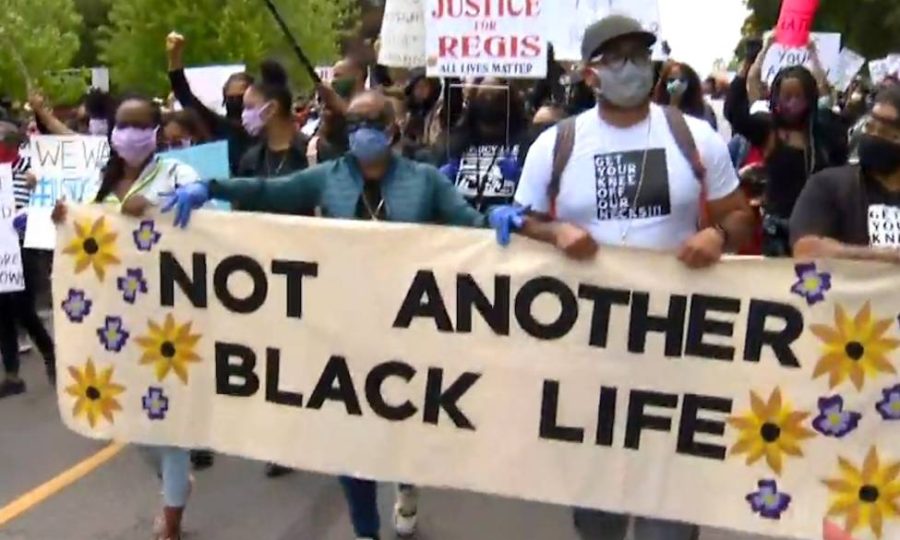In a previous post, Janet raised questions about how solidarity might spontaneously arise during the pandemic to challenge anti-Asian racism. Drawing on Arendt and Dean, Janet emphasizes that responsibility to others, rather than feelings of affection or good will, must be central in a conception of solidarity. I have also drawn attention to the need for a relational account of solidarity in relation to public health ethics.
In the past month, the spontaneity of solidarity seems to have come to the fore as protests have erupted across the world, ignited most immediately by the murder of George Floyd by Minneapolis policer officers. Though Floyd’s murder might be a catalyst, these protests respond to a long history of White supremacy and police brutality towards Black people.
Solidarity in pandemic ethics
These protests help me articulate something I have found puzzling about how solidarity has been described during the pandemic. In late March and April, staying at home and wearing masks were described as the epitome of expressing solidarity. These interventions prevent you from spreading the infection if you are asymptomatic. As my colleague Patricia Marino noted last week, many people still seem to misunderstand that wearing masks is about others, not yourself.
This misunderstanding is partially due, perhaps, to how “pandemic ethics” has often taken an individualistic focus, at least in places such as Canada where, for example, wearing non-medical masks is less common than in other parts of the world.
Relational accounts of public health ethics, like the model offered by Nuala Kenny, Susan Sherwin, and Françoise Baylis seek to situate health concerns in notions of the collective good rather than an individual’s health interests. Calls to stay at home or wear masks thus align with the way they describe relational solidarity: “What matters in public health is a shared interest in survival, safety and security–an interest that can be effectively pursued through the pursuit of public goods” such as scientific evidence and ways of managing infectious diseases (11).
Negative solidarity
I totally agree that staying at home and wearing non-medical masks are important expressions of solidarity. Yet, I struggle to articulate why I am uneasy with these actions being extolled as exemplars of solidarity.
In an essay originally published in 1957, Arendt says that technology has brought the world together in a kind of solidarity. But, she calls this solidarity negative because it was based on fear of the atomic bomb and the destruction of life. This solidarity, she argues, “does not in the least guarantee a common future” (Men in Dark Times, p. 83).
Arendt’s concern about negative solidarity based on fear and individual interests seems lurking in how Kenny, Sherwin, and Baylis describe relational solidarity. An interest in survival, even the survival of us all, privileges physical life over political flourishing. It leaves unexplored what comes after we survive, what form that survival takes, and how we envisage living together.
Staying at home or wearing masks are not necessarily or inherently a mode of negative solidarity. But, I think these acts can be interpreted in a way that diminishes the significance of the relational in focusing on survival rather than political community.
Of course, sometimes the separation between physical survival and political flourishing seems to be a false dichotomy. At least, the statement Black lives matter suggests as much. For me, the difference between negative and positive solidarity hinges on whether we direct attention and action toward structural injustice.
Positive solidarity
Positive solidarity, according to Arendt, must be connected with political responsibility. Perhaps I have put too much emphasis on what wearing masks symbolize with respect to solidarity. Really, they are just a resource that we use when we act in solidarity. For example, protest organizers encourage people to wear masks to protect your fellow community members.
Further, solidarity intersects with a recognition of historical and structural injustices. In the United States, Black people die from COVID-19 at 3.57 times the rate of white people. This disparity is not caused by some biological trait, but rather, indicates how racism is embedded in health systems. Some groups of people have been made more vulnerable to the virus than others.
The COVID-19 pandemic isn’t the only public health crisis communities currently face. In response to the protests, Cleveland, Denver, and Indianapolis have declared racism to be a public health crisis. In Canada, Black and immigrant communities face higher risks associated with COVID-19, and yet this remains unrecognized by Ontario’s response to the pandemic.
Solidarity during a pandemic is, or ought to be, political responsibility. To focus solely on masks (as I did previously) is a return to an individualistic take on pandemic ethics. As Janet put it, solidarity is about our responsibility toward others and addressing structural inequities. Masks become something we use to help us accomplish this work, but are not the exemplar of what it means to show solidarity during a pandemic.
A note in closing: Some ways to support anti-Black racism in Kitchener-Waterloo
White supporters have been encouraged to take time to listen to Black people’s experiences, learn about racist histories in our communities, and amplify non-white voices. I recommend following Black Lives Matter Waterloo Region on Facebook. Their page is accessible even if you, like me, don’t have a Facebook account. They post many links to resources and actions people can take.
In addition, here a few links in case you want to support local initiatives in Waterloo Region (or nearby).
- A list of Black-owned businesses in Kitchener-Waterloo (East African Cafe is a personal favourite)
- The Conscious Kitchen is a vegan business in Guelph that also delivers to Kitchener-Waterloo
- African Caribbean and Black Network of Waterloo Region
- African Community Wellness Initiative
- Black Lives Matter Waterloo Region Solidarity Fund
- Prisoner Emergency Support Fund, which supports incarcerated people in Ontario during COVID-19
Cover photo taken from an article by Global News.
